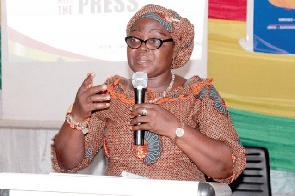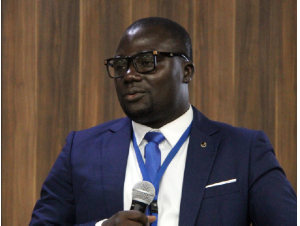Justina Owusu-Banahene, the Bono Regional Minister, has urged financial institutions to generate innovative products specifically designed for women entrepreneurs to effectively manage their agribusinesses.
She stressed the need for the institutions to offer training in literacy and management to empower women to manage their businesses well.
The Regional Minister emphasised that the training would provide support and empower the women by providing them with financial tools and resources to promote food security and enhance economic growth and community well-being.
Madam Owusu-Banahene made the remarks at the Sixth Annual Women in Food and Agricultural Leadership Training Forum and Gold in the Soil Awards in Sunyani.
The event, organised by Agribusiness Foundation, was on the theme: “Overcoming the Barriers to Women in Agribusiness Development: The Role of Stakeholders,’’ and aimed at addressing challenges and barriers faced by women in agribusiness.
The programme brought together more than 600 rural women farmers, producers, farmers with disability, farmers involved in agro-processing, women farmers within the value chain, marketers and other service providers within the value chain from across the country.
Madam Owusu-Banahene stressed government’s commitment to implementing policies and programmes that promoted gender equality and empower women in agriculture.
She highlighted the goal of removing structural barriers to ensure that women had equal opportunities to excel in the agricultural sector.
Madam Owusu-Banahene acknowledged that government’s efforts alone was insufficient and, therefore, called on the private sector to invest in women’s agribusiness initiatives and create inclusive value chains that provided fair opportunities for all.
She emphasised the importance of other Civil Society Organisations and groups advocating women’s rights, providing capacity-building programmes, and supporting grassroots initiatives that empowered women in the agricultural sector.
Mr Dennis Abugri Amenga, the Regional Director of Agriculture, revealed that approximately 48 per cent of the estimated 139,827 farmers in the Bono Region were women.
He said women were instrumental in shaping the agribusiness value chains, which impact the economy significantly.
He highlighted the existence of gender-induced socio-cultural barriers that hindered women’s access to production and productivity-enhancing resources.
Mr Amenga said a study conducted by CAB International, centre for agriculture and biosciences in the Bono Region, confirmed that gender disparities faced by women farmers limited their participation in training programmes, access to inputs and extension services.
He mentioned the Food and Agriculture Organisation report, which estimated that women could potentially increase production by 20 to 30 per cent if provided with access to productive resources equivalent to their male counterparts.
Ms Alberta Nana Akyaa Akosa, the Founder and Executive Director of Agrihouse Foundation, said the programme would provide training and capacity building sessions, as well as farmer clinics that primarily focused on women farmers.
The clinics were to showcase the work of women farmers and explore how government interventions could support their growth and advancement within the agricultural sector.
Ms Akosa observed that this year’s event was significant as it marked the first time a young woman, aged 28, participated in the Gold and Soil Awards, which typically features women farmers between ages 28 and 70 years.
She said the milestone served as a strong indication that young women were increasingly recognising the opportunities in farming and taking on significant roles within the agricultural value chain.
Business News of Thursday, 11 July 2024
Source: GNA

















